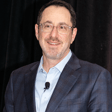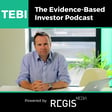
Ep 10: Morningstar's new boss
Kunal Kapoor has just taken over as CEO of Morningstar from the company’s billionaire founder Joe Mansueto. It’s one of the biggest jobs in global investing; Morningstar enjoys huge influence among investment professionals, advisers, journalists and end investors, employing more than 4,200 people around the world. Whatever happens in the investing industry over the next 20 years, Kunal Kapoor is likely to be one of the movers and shakers.
Kapoor’s background is in analysing and rating actively managed funds and, as you would expect, his views on the value of active management differ from my own. I was, however, encouraged to hear that he does share a very similar perspective to TEBI’s on such critical issues as fees and charges, the rôle of financial advice and the importance of putting the interests of consumers first.
Whatever your views on those topics, I think you’ll find this a fascinating and insightful interview.
















